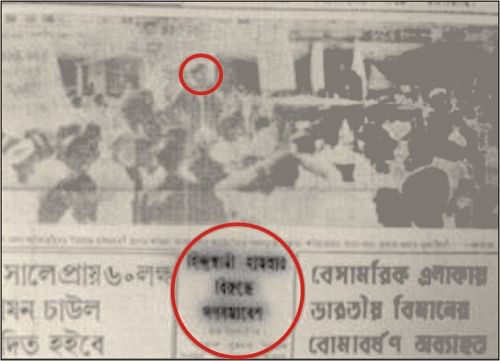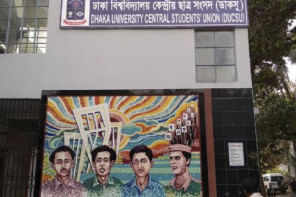<i>1971 remnants still active in politics</i>

The daily Azad news and photograph published just five days before the Victory Day shows Jamaat's Ali Ahsan Mojahid talking as Al-Badr chief against the birth of Bangladesh. Photo: STAR Collection
A band of key players, who made a botched attempt to abort the birth of Bangladesh, is none other than the top brass of Jamaat-e-Islami, young in 1971.
They had joined forces with the Pakistani occupation army to commit what shaped up into a full-blown genocide in the nine-month bloody war.
For Motiur Rahman Nizami, now chief of Jamaat and the then president of Islami Chhatra Shangha, it was a parallel struggle to protect every inch of Pakistan during the Liberation War.
The head of the Islamic party said the activists of the student front had been pledge-bound to attack the mainland Hindustan [India] to protect a united Pakistan.
Nizami's speech is evident in the September 8, 1971 issue of the Daily Sangram that carried a report headlined “Chhatra Shangha activists will protect every inch of Pakistan's land”.
Nizami worked his way deeper into mainstream politics with the backing of the BNP-led four-party alliance. He is now an alliance candidate from Pabna-1 constituency for the year-end national elections.
Nizami is not alone.
Many of the current Jamaat top leaders had moved against Bangladesh's liberation. Leaders of Islami Chhatra Sangha, now known as Islami Chhatra Shibir, and some other groups had been involved in anti-liberation activities.
Jamaat's present secretary general Ali Ahsan Mohammad Mojahid was president of East Pakistan Islami Chhatra Shangha in 1971.
The Jamaat leader who moved up the ranks after independence is now contesting the ninth parliament elections from Faridpur-3 constituency on the slate of BNP-led alliance.
In 1971, Mojahid directed his party workers to build Al-Badr Bahini to resist freedom fighters, according to a "Fortnightly Secret Report on the Situation in East Pakistan". In line with an official procedure, the report had regularly been dispatched by the then East Pakistan home ministry to General Yahya Khan, the head of government.
Many researches, academic studies, accounts of both victims and collaborators, and publications including newspapers revealed that Mojahid, who headed the Al Badr team in Dhaka at the time, allegedly led those who had been involved in the killings of the intellectuals -- only two days before the victory of Bangladesh on December 16, 1971.
Thousands of people still bear the scars of war crimes by Jamaat and its student front Islami Chhatra Shangha, and some other controversial outfits such as Nizam-e-Islami. Jamaat's opposition of the struggle for independence has been documented in different publications including those by Jamaat itself.
At a rally to mark what was then known as Badr Day on November 7, 1971, Mojahid came up with a four-point programme to "wipe Hindustan off the face of the earth".
"Move forward with your head held high and with the Quran in heart to materialise the programme. If necessary we will march up to New Delhi and fly the flag of greater Pakistan," he told the 1971 rally.
He raised funds, organised armed trainings for Razakars and persuaded students to join the paramilitary force, designed to eliminate freedom fighters.
Addressing a function of the Chhatra Shangha in Faridpur on September 15, 1971, Mojahid said: “Razakars and Al Badr forces and all other voluntary organisations have been working to protect the nation from the collaborators and spies of India.”
"But unfortunately we observe that a section of political leaders like ZA Bhutto, Kawsar Niazi, Mufti Mahmud and Asghar Khan have lately been making objectionable remarks about the patriots."
Ironically, the 1971 publications of The Daily Sangram, a newspaper known as the mouthpiece of Jamaat, carry evidence enough to expose Jamaat's anti-liberation roles.
An issue of the Sangram published on September 15, 1971 quoted Nizami, also the then commander-in-chief of Al Badr, as saying: "Everyone of us should assume the role of a soldier of an Islamic country. With assistance of the poor and the oppressed, we must kill those who are engaged in the war against Pakistan and Islam."
The same newspaper on the third page of its September 16, 1971 issue ran another report headlined “No force on earth will be able to destroy Pakistan". In the news report, Nizami called on people to face a conspiracy of the so-called Banga Daradi (Lover of Bengal).
Jamaat formed Razakar Bahini and Al-Badr Bahini to oppose Bangladesh's struggle to win freedom from Pakistan.
At a rally of 96 Jamaat workers at an Ansar camp on Khan Zahan Ali Road in Khulna in May 1971, as historical documents show, Moulana Yusuf established the Razakar force.
"It was also Moulana Yusuf who gave this force its name," according to Genocide '71, a book that details accounts of the wartime killers and collaborators.
On November 28, 1971, Yusuf spoke to journalists in Karachi, "The Razakars are standing shoulder to shoulder with our brave soldiers in combating the Indian aggression."
In order to annihilate miscreants, the Razakars should be provided with more modern weapons, Yusuf suggested.
The number of the Al-Badr and Al-Shams was 100,000 at one point in time, plus the Mujahid force, Genocide '71 quoted Yusuf as saying.
Another member of Jamaat's central executive committee, ATM Azharul Islam, was the leader of Islami Chhatra Sangha in Rangpur.
The so-called "Fortnightly Secret Report" said Azharul Islam had presided over a conference of Islami Chhatra Sangha in Rangpur town on October 17, 1971.
Mojahid had also addressed the conference, “explaining the present situation of the country and urging the party workers to mobilise the youths of Islamic spirit and launch a strong movement against anti-Islamic activities”. Mojahid also urged them to form Al-Badar Bahini at different levels to defend the country from "internal and external attacks".
Mir Kasem Ali, another top player on Jamaat's central executive committee, was general secretary of East Pakistan Islami Chhatra Sangha in 1971.
On December 10 of the same year, five days before the victory, Al Badr force organised a rally at Baitul Mukarram Mosque to orchestrate public opinion against 'Hindustani attacks'. Kasem also addressed the rally, according to a news report published in the Daily Azad on December 11, 1971.
Kasem called upon people not to get misled by the “rumours and false publicity of Hindustani warmongers and Akash Bani”, the report said.
"We are fighting for truth and fairness. Victory must be on our side with the blessings of Khoda", Kasem was quoted in the report as saying.
Kasem was also president of Chittagong City Islami Chhatra Sangha and chief of the Chittagong district Razakar forces in 1971. It is alleged in several historical documents, Kasem led the Al Badr force in Chittagong.
In the latest development, Kasem filed a nomination paper to contest the ninth parliamentary election from Dhaka-8 constituency only to pull back.
The list goes on.
Muhammad Kamaruzzaman, senior assistant secretary general of Jamaat, launched himself into the polls foray with a ticket from the four-party alliance in Sherpur-1 constituency. The Jamaat leader has a tainted past with Islami Chhatra Sangha and is blamed for his close links to the Al Badr force.
"The Chhatra Sangha of Mymensingh district was converted into the Al Badr force and provided with military training. The man responsible for organising the Chhatra Sangha into the Al-Badr was the chief of the Mymensingh district Islami Chhatra Sangha: Kamaruzzaman," Genocide '71 says.
"Under Kamaruzzaman, the entire body of workers belonging to the Mymensingh district Chhatra Sangha were recruited into the Al Badr within a month. That Kamruzzaman was indeed the man who consolidated this force in its initial stages is obvious from a report that was published on August 16, in the Sangram," the book says.
In the early 1990s, a People's Inquiry Commission was formed to investigate the activities of war criminals and collaborators.
According to a report by the commission, Jamaat's incumbent central executive committee member Moulana Abdus Sobhan had served the party as its acting chief of Pabna during the Liberation War. He was nominated for the so-called by-election in 1971.
With the blessings of the four-party alliance, Sobhan found himself in the ninth parliamentary election, set for December 29.
Sobhan was the vice president for Pabna unit of Peace Committee, an organisation of Pakistani collaborators. A field-level investigation revealed that Sobhan had organised the Al Badar and Razakar and had been involved in a series of criminal activities.
The dreaded year, 1971, calls to mind the active role of Delwar Hossain Saydee, now a member of Jamaat's central executive committee. Saydee played an active part in organising Razakar, Al Badr and Al Shams forces in the southern district of Pirojpur, his stronghold, to assist the Pakistan army in the crackdown on Bangladeshis, says the commission report.
"Saydee was not associated with any political party in 1971, but conducted his activities in his individual capacity as a 'maulana' or Islamic scholar. There are allegations that he actively helped the Pakistani forces in their campaign of killings, looting, rape, arson, by forming local para-military forces," says the report.
"During the war, he along with four associates formed an organisation called "Fund of the Five". The principal aim of the organisation was to loot and take over property of freedom fighters and Bangalee Hindus. He used to sell looted property and run a profitable business from the sales proceedings."
Saydee, an active player in politics, entered this year's election race, as a candidate from Pirojpur-1 constituency, leveraged by the BNP-led alliance.
Abdul Kader Molla, currently a central executive committee member of Jamaat, was known as a "butcher" to Bangladeshis in the Dhaka suburb of Mirpur in 1971, according to the report of the commission headed by the late poet Begum Sufia Kamal.
"Mirpur at the time (1971) was mainly populated by non-Bengali Muslim migrants from India, many of whom were among the most ardent champions of the Pakistan army's actions in Bangladesh,” says the report.
One of the largest mass graves of people butchered by Pakistani troops and their allies was discovered in the Shialbari area of Mirpur after independence.
Local people told the commission that Molla was behind the killings of thousands of Bangalees in Shialbari and Rupnagar areas of Mirpur during the war.
"According to local inhabitants, Molla had begun his killing spree even before the army started its operation", the report says.

 For all latest news, follow The Daily Star's Google News channel.
For all latest news, follow The Daily Star's Google News channel. 



Comments